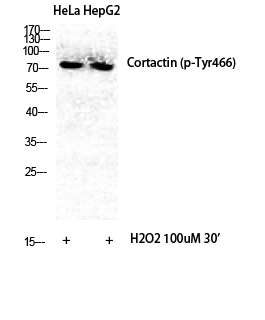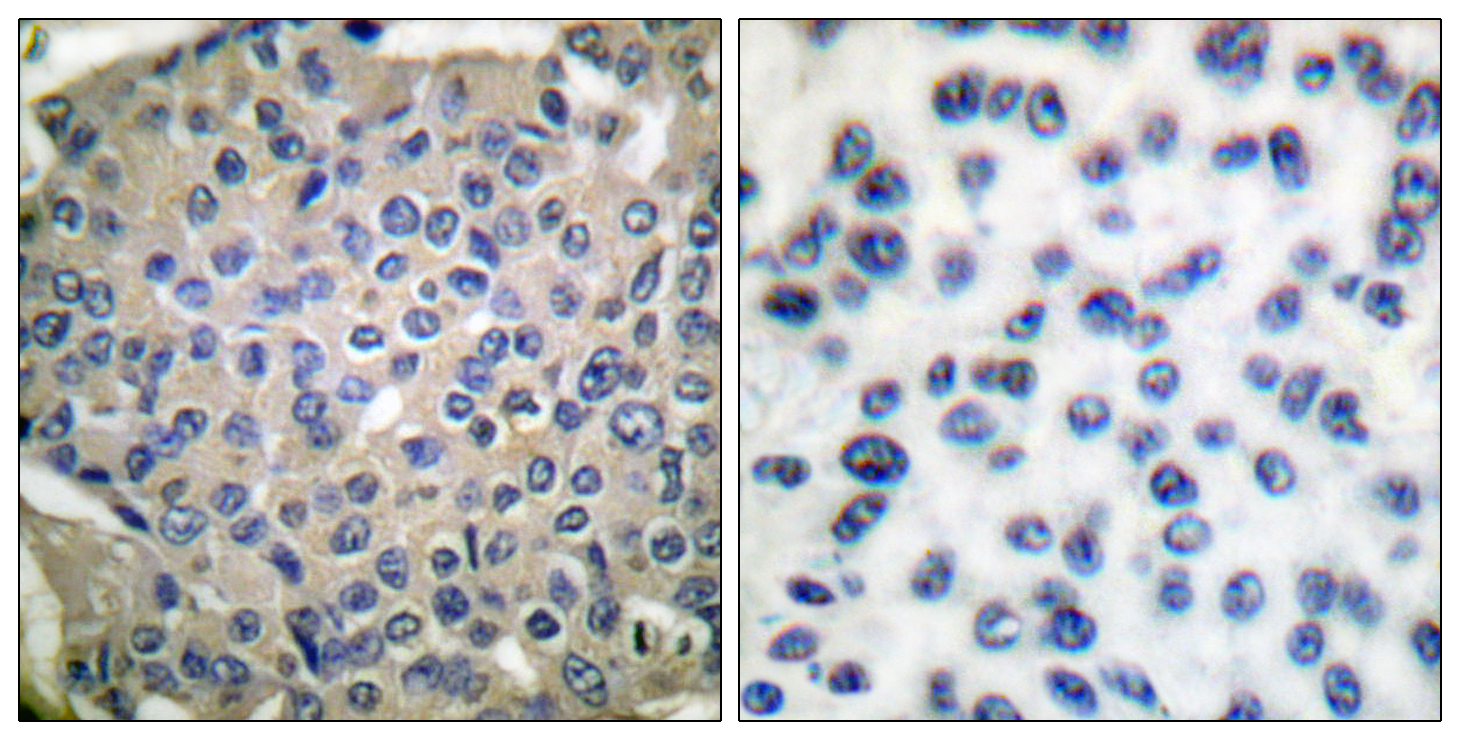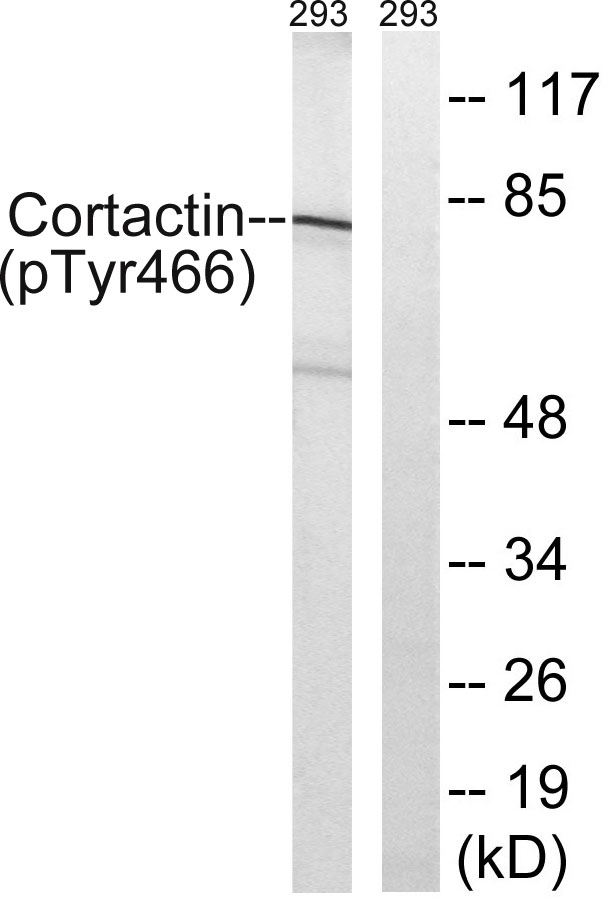Cortactin (phospho Tyr466) Polyclonal Antibody
- Catalog No.:YP0846
- Applications:WB;IHC;IF;ELISA
- Reactivity:Human;Mouse;Rat;Monkey
- Target:
- Cortactin
- Fields:
- >>Tight junction;>>Bacterial invasion of epithelial cells;>>Pathogenic Escherichia coli infection;>>Shigellosis;>>Proteoglycans in cancer
- Gene Name:
- CTTN
- Protein Name:
- Src substrate cortactin
- Human Gene Id:
- 13043
- Human Swiss Prot No:
- Q14247
- Mouse Gene Id:
- 13043
- Mouse Swiss Prot No:
- Q60598
- Immunogen:
- The antiserum was produced against synthesized peptide derived from mouse Cortactin around the phosphorylation site of Tyr466. AA range:441-490
- Specificity:
- Phospho-Cortactin (Y466) Polyclonal Antibody detects endogenous levels of Cortactin protein only when phosphorylated at Y466.
- Formulation:
- Liquid in PBS containing 50% glycerol, 0.5% BSA and 0.02% sodium azide.
- Source:
- Polyclonal, Rabbit,IgG
- Dilution:
- WB 1:500 - 1:2000. IHC 1:100 - 1:300. IF 1:200 - 1:1000. ELISA: 1:20000. Not yet tested in other applications.
- Purification:
- The antibody was affinity-purified from rabbit antiserum by affinity-chromatography using epitope-specific immunogen.
- Concentration:
- 1 mg/ml
- Storage Stability:
- -15°C to -25°C/1 year(Do not lower than -25°C)
- Other Name:
- CTTN;EMS1;Src substrate cortactin;Amplaxin;Oncogene EMS1
- Observed Band(KD):
- 80kD
- Background:
- cortactin(CTTN) Homo sapiens This gene is overexpressed in breast cancer and squamous cell carcinomas of the head and neck. The encoded protein is localized in the cytoplasm and in areas of the cell-substratum contacts. This gene has two roles: (1) regulating the interactions between components of adherens-type junctions and (2) organizing the cytoskeleton and cell adhesion structures of epithelia and carcinoma cells. During apoptosis, the encoded protein is degraded in a caspase-dependent manner. The aberrant regulation of this gene contributes to tumor cell invasion and metastasis. Three splice variants that encode different isoforms have been identified for this gene. [provided by RefSeq, May 2010],
- Function:
- function:May contribute to the organization of cell structure. The SH3 motif may function as a binding region to cytoskeleton. Tyrosine phosphorylation in transformed cells may contribute to cellular growth regulation and transformation.,online information:Cortactin entry,similarity:Contains 1 SH3 domain.,similarity:Contains 7 cortactin repeats.,subcellular location:Associated with membrane ruffles and lamellipodia.,subunit:Interacts with SHANK2 and SHANK3 via its SH2 domain. Also interacts with FGD1 (By similarity). Interacts with PLXDC2.,
- Subcellular Location:
- Cytoplasm, cytoskeleton . Cell projection, lamellipodium . Cell projection, ruffle. Cell projection, dendrite . Cell projection . Cell membrane ; Peripheral membrane protein ; Cytoplasmic side . Cell projection, podosome . Cell junction . Cell junction, focal adhesion . Membrane, clathrin-coated pit . Cell projection, dendritic spine . Cytoplasm, cell cortex . Colocalizes transiently with PTK2/FAK1 at focal adhesions (By similarity). Associated with membrane ruffles and lamellipodia. In the presence of CTTNBP2NL, colocalizes with stress fibers (By similarity). In the presence of CTTNBP2, localizes at the cell cortex (By similarity). In response to neuronal activation by glutamate, redistributes from dendritic spines to the dendritic shaft (By similarity). Colocalizes with DNM2 at the basis
- Expression:
- Coronary artery,Epithelium,Mammary gland,Placenta,Platelet,Testis,
- June 19-2018
- WESTERN IMMUNOBLOTTING PROTOCOL
- June 19-2018
- IMMUNOHISTOCHEMISTRY-PARAFFIN PROTOCOL
- June 19-2018
- IMMUNOFLUORESCENCE PROTOCOL
- September 08-2020
- FLOW-CYTOMEYRT-PROTOCOL
- May 20-2022
- Cell-Based ELISA│解您多样本WB检测之困扰
- July 13-2018
- CELL-BASED-ELISA-PROTOCOL-FOR-ACETYL-PROTEIN
- July 13-2018
- CELL-BASED-ELISA-PROTOCOL-FOR-PHOSPHO-PROTEIN
- July 13-2018
- Antibody-FAQs
- Products Images

- Immunofluorescence analysis of Hela cell. 1,Cortactin (phospho Tyr466) Polyclonal Antibody(green) was diluted at 1:200(4° overnight). 2, Goat Anti Rabbit Alexa Fluor 488 Catalog:RS3211 was diluted at 1:1000(room temperature, 50min). 3 DAPI(blue) 10min.

- Western Blot analysis of various cells using Phospho-Cortactin (Y466) Polyclonal Antibody diluted at 1:500
.jpg)
- Western Blot analysis of 293 cells using Phospho-Cortactin (Y466) Polyclonal Antibody diluted at 1:500

- Immunohistochemistry analysis of paraffin-embedded human breast carcinoma, using Cortactin (Phospho-Tyr466) Antibody. The picture on the right is blocked with the phospho peptide.

- Western blot analysis of lysates from 293 cells, using Cortactin (Phospho-Tyr466) Antibody. The lane on the right is blocked with the phospho peptide.



